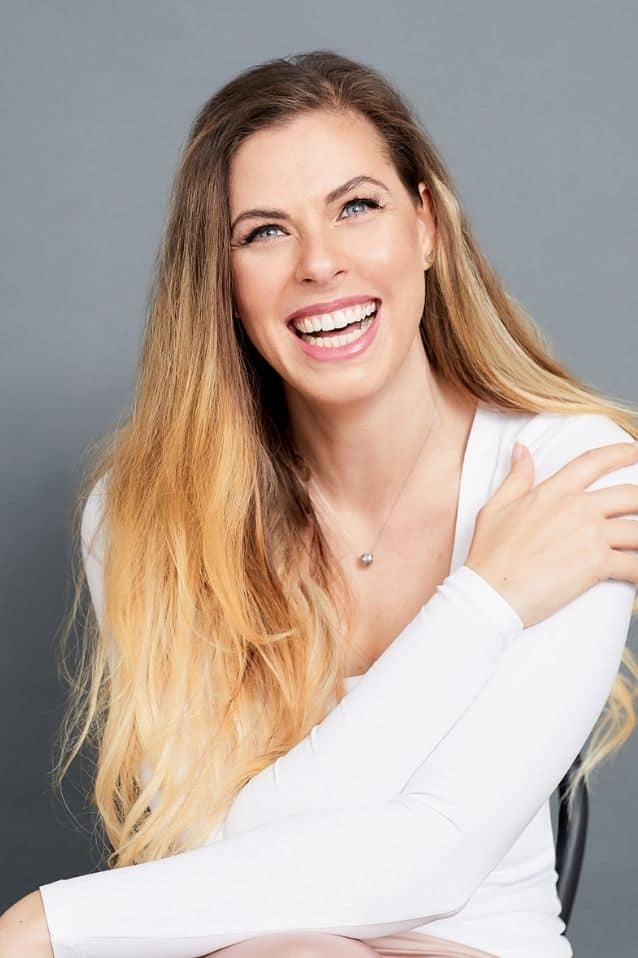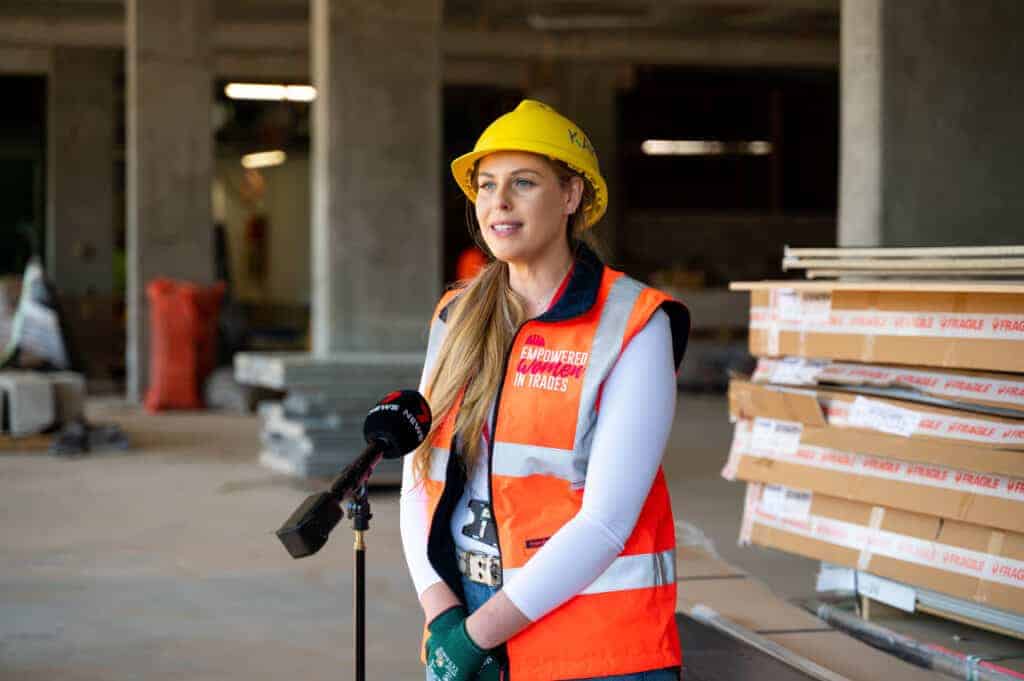In 2017, a life-altering horse riding accident shifted the trajectory of Hacia Atherton’s life. Since then, she has transformed her challenges into opportunities; morphing from a national-level athlete ready to compete on the global stage, to an award-winning female leader with a disability, in Australia’s most male-dominated field.

Named as one of the Top 30 Women Disruptors by the NYC Journal (2021), 2024 Telstra Best of Business Awards Winner (Vic), Top 100 Women in Construction 2023, and winner of an Australian Enterprise Award in 2024, Hacia founded Empowered Women in Trades (EWIT), where she inspires people across all industries, in particular women navigating their professional development within skilled trades.
Hacia spoke with WDEN and The Adaptable CEO Podcast co-hosts Tiffani and Anja, to share insights into her dreams, challenges and successes. Listen to the full podcast episode here. Some key learnings from Hacia:
What consumes the mind, is reflected in how we live our lives and our future trajectory. Hacia, what are the three things you think about the most?
- How can I show up and be the best version of myself (with the pain that I’m dealing with today). Not comparing myself to what I was a week ago, a month ago, or anything like that. And really, each day just think about who can I be today? What’s my best self today? And depending on my pain levels, the answer to that will always be different.
- Muhammad Ali mantra: ‘Suffer now and live forever a champion’ – I always think about never giving up and creating that space to fall apart and cry. When you are living with the challenges that I live with, you’ve got to create that space to be able to feel the pain, to be able to feel the overwhelm, to be able to just be okay with not being okay and allow yourself to suffer in that moment. And then live a champion forever and come out of that space.
- In every challenge, there’s an opportunity for transformation. So every day: where is that challenge, where is that opportunity? And what transformation can I do for myself and the people around me?
What lessons did being a competitive athlete give you to adapt better in your recovery and business?
- Find the competitive spirit of being a competitor against yourself. And I think high level athletes, people often think they’re out there trying to beat other athletes. No, you always are trained to beat yourself. You’re always looking at your own personal best. You’re always looking at your own score, and you’re always competing against yourself. As a high level athlete, that’s what our coaches train us to do. It’s always analysing your weaknesses, getting better at that and supercharge your strengths. It’s a very internal looking lens.
- How do I do better and how do I take my failure and fail forward and fail fast and fail quicker? You don’t bring the emotion into it, you bring the analytical brain into it. You screw up. You’ve got to let go, especially in dressage, like you’ve got so many different movements. And if you screw up one movement, and if you stay in that headspace about that movement, you’re gonna stuff up the next five movements. So you got to let go of your failures in the moment you stuffed that movement, who cares you’re on to the next movement.
What are the lasting impacts on your life post-accident?
Redefining what success looked like. Because for me every day is different. Some days after major surgery of having my hip replaced, success was just standing up for a few seconds or a couple of minutes.
Secondly, I used to be so confident in myself with where I was going with my dressage and I just had this belief I was going to represent Australia. I just had this unbreakable unconditional self belief and self confidence. The lasting effect of the accident is really that it almost empowered a negative Gremlin inside me, it has such a greater hold on me that it never had before. And it feeds itself on the pain, that feeds itself on the judgement that I get from people when I park in a disabled Park [for example] and people have a go at me and be like, “you’re not disabled”, “you don’t belong in that car park” or “you don’t belong in the support groups” because I don’t ‘look disabled’. I’m not what society tells me disabled should be. And I think for me, that’s that really deep ingrained impact of feeling like I don’t belong in any space. I’m not fully abled. I’m not what society deems disabled should look like. I often feel lost and like I don’t belong in any world. So the lasting impact of loneliness – I often feel very lonely.
What led to Empowering Women in Trades?
My own personal journey of really enjoying the trades and then also reflecting on my unconscious bias and the unconscious bias of my family because I’m a fifth generation plumbing family, and the trades were never put in front of me as a career path. And nor did I ask to ever experience that career pathway. So that really made me start to think about the unconscious bias that women in our society are having, and I wanted to create a really safe space for women to be curious, to be vulnerable to come in and really let go of that unconscious bias that they were saying to themselves that they don’t belong in this industry or they don’t belong in this space. I have five generations of plumbers behind me, a family company that employs 30-40 trades people and I felt that I couldn’t ask to access that career opportunity. So what hope did other women have out there that weren’t anywhere near the industry? So I really wanted to be that person to open up the doors of opportunity to create those safe spaces for women to be vulnerable in their journey of getting curious about trades, and then be able to support them to make informed decisions if the skilled trades industry is an industry for them.

I felt the information that was out there didn’t really support the female journey into trades. Research shows that women won’t apply for a job unless they meet 90% of all the requirements, but women don’t have enough information to make those informed decisions if trades is for them. So I really wanted to design an experience into trades that supported the feminine journey into trades.
Currently, women represent 3% of skilled trades, and my goal is to have female representation at 30% by 2030. We’ve got seven years to go from 3% to 30%.
What advice would you give to your younger self with everything you know now?
In every challenge, there’s an opportunity to transform and really embrace the challenges, really lean into them and don’t avoid them. Find opportunity in that discomfort, push back against that feeling of being crushed to create your own space, be big, walk into a room and take up space. And I think that’s really important for women to actually go and take up space and don’t feel ashamed of doing it. The call to action for all women is to go and take up space. Don’t feel like you can’t take centre stage because you absolutely can. So find the opportunities in your challenges and go and take up space.
You can connect with Hacia here:
Hacia Atherton – https://haciaatherton.com/
Empowering Women in Trades – https://ewitrades.com/
Listen to the full episode, and more on The Adaptable CEO – available on Apple Podcasts, Spotify and where you listen to your podcasts.
